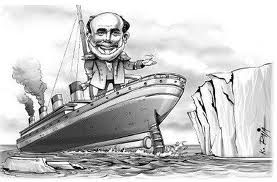Author's posts
Jun 09 2011
Punting the Pundits
Punting the Pundits” is an Open Thread. It is a selection of editorials and opinions from around the news medium and the internet blogs. The intent is to provide a forum for your reactions and opinions, not just to the opinions presented, but to what ever you find important.
Thanks to ek hornbeck, click on the link and you can access all the past “Punting the Pundits”.
Robert Sheer: The Bernanke Scandal: Full-Frontal Cluelessness

ow I wish that Ben Bernanke would get caught emailing photos of his underwear-clad groin. Otherwise we don’t stand a chance of reversing this administration’s economic policy, which is shaping up to be every bit as disastrous as that of its predecessor.
Indeed, the Fed chairman’s much anticipated remarks on Tuesday take one back to the contemptuous indifference of a Herbert Hoover to the public’s suffering: Bernanke dismissed the wobbly economy with its anemic 1.8 percent first-quarter growth as merely “somewhat slower than expected.” The rise in unemployment to 9.1 percent was “some loss of momentum.”
The problem with Bernanke is that he is utterly clueless as to the stark pain and fear endured by the 50 million Americans who have experienced, or face the prospect of, losing their homes. His remarks reflected the insularity of a ruling-power elite that is magnificently impervious to the damage that Bernanke’s policies in the current and past administration helped inflict on what used to be called the American way of life. This is a man who assured us there was no housing crisis, while his policies at the Fed encouraged the mortgage securitization swindles that caused the meltdown of the economy.
John Nichols: AFL’s Trumka on Pols Selling Out Workers: ‘I’ve Had a Snootful of This S**t!’
AFL-CIO President Richard Trumka sent his strongest signal yet about the labor movement’s frustration with the dysfunctional politics of the moment-where Republicans go to extremes on behalf of big banks and multinational corporations, Democrats compromise and working families are left out of the equation.
Speaking Tuesday to the National Nurses United conference in Washington, where more than one thousand nurses from across the country rallied to begin the push to replace the politics of setting for less with a unapologetic demands for a new economic agenda, Trumka found a plenty of takers for his agressively progressive message.
“We want an independent labor movement strong enough to return balance to our economy, fairness to our tax system, security to our families and moral and economic standing to our nation,” declared Trumka, who in recent months has been repositioning the AFL-CIO as a force that will hold Republicans and Democrats to what he describes as “a simple standard: “Are they helping or hurting working families?”
From Marmet to Blair, West Virginia, hundreds of activists are marching across the Appalachian region this week to honor the historic Battle of Blair Mountain of 1921. This event, designed to mark one of the biggest civil uprisings in the United States history and the largest armed insurrection since the American Civil War, however, is not just about history. Appalachia Rising and Friends of Blair Mountain are using the five-day march to protest the controversial practice of mountaintop removal coal mining.
Dave Roberts of Grist detailed well the brutality of mountaintop removal in a 2008 guest post at TheNation.com:
“Mountain ridges and peaks are clear-cut, stripped of all trees and other flora. Explosives are buried underground, and enormous blasts dislodge millions of tons of rock, dirt, soil, and animal and plant life. That ‘overburden’ is then carted away or dumped into the stream and creek beds in the mountain hollows below, destroying or polluting thousands of miles of running water. Huge 20-story-tall draglines pull away the rock to expose coal seams. Similarly huge machines then yank the coal out and dump the remaining waste down into those streams.”From Marmet to Blair, West Virginia, hundreds of activists are marching across the Appalachian region this week to honor the historic Battle of Blair Mountain of 1921. This event, designed to mark one of the biggest civil uprisings in the United States history and the largest armed insurrection since the American Civil War, however, is not just about history. Appalachia Rising and Friends of Blair Mountain are using the five-day march to protest the controversial practice of mountaintop removal coal mining.
Dave Roberts of Grist detailed well the brutality of mountaintop removal in a 2008 guest post at TheNation.com:
“Mountain ridges and peaks are clear-cut, stripped of all trees and other flora. Explosives are buried underground, and enormous blasts dislodge millions of tons of rock, dirt, soil, and animal and plant life. That ‘overburden’ is then carted away or dumped into the stream and creek beds in the mountain hollows below, destroying or polluting thousands of miles of running water. Huge 20-story-tall draglines pull away the rock to expose coal seams. Similarly huge machines then yank the coal out and dump the remaining waste down into those streams.”
Amy Goodman: Heeding the Warnings of Environmental Reveres
ef it feels.”
These two lines were written by Henry Wadsworth Longfellow in his poem “Snow-Flakes,” published in a volume in 1863 alongside his epic and better-known “The Midnight Ride of Paul Revere.” Much of the news chatter this week has been about Sarah Palin’s flubbing of the history of Revere’s famous ride in April 1775. Revere was on a late-night, clandestine mission to alert American revolutionaries of an impending British attack. Palin’s incorrect version had Revere loudly ringing a bell and shooting a gun on horseback as a warning to the British to back off.
Pathetically, as well, the media has been awash with New York Congressmember Anthony Weiner’s string of electronic sexual peccadillos. Punctuating the sensationalism, and between the TV commercials from the oil, gas, coal and nuclear industries, are story after story of extreme weather events. Herein lies the real scandal: Why aren’t the TV meteorologists, with each story, following the words “extreme weather” with another two, “climate change”? We need modern-day eco-Paul (or Paula) Revere to rouse the populace to this imminent threat.
Hanah Gurman: Bigger than Blackwater: Arming the UAE
The International Defense Exhibition, otherwise known as IDEX, has been held bi-annually in the United Arab Emirates (UAE) since 1993. It is the largest defense expo in the Middle East and North Africa and one of the biggest in the world. But far from being a one-off, it highlights the UAE’s growing stature as a global arms buyer.
This year’s IDEX took place in the glistening Abu Dhabi National Exhibition Centre. Its high ceilings and massive rooms displayed a diverse array of high-tech weaponry against the backdrop of heavily illuminated signboards like the ones you see in the showrooms of luxury car dealerships. All the big Western defense corporations were there – Lockheed Martin, Boeing, Dyncorp, Northrup Grumman, European Aeronautic Defense and Space Co. – as well as Chinese companies, including China North. There were also a host of local companies including Arabian Aerospace, Abu Dhabi Ship Building Company, and the state-owned Mubadala. Like all of these events, it was a heavily male enterprise. The exhibitors wore suits. The visitors wore either the military uniform of the UAE or traditional Arab dress.
Jun 09 2011
On This Day In History June 9
This is your morning Open Thread. Pour your favorite beverage and review the past and comment on the future.
Find the past “On This Day in History” here.
June 9 is the 160th day of the year (161st in leap years) in the Gregorian calendar. There are 205 days remaining until the end of the year.

On this day in 1973, Secretariat wins Triple Crown
With a spectacular victory at the Belmont Stakes, Secretariat becomes the first horse since Citation in 1948 to win America’s coveted Triple Crown–the Kentucky Derby, the Preakness, and the Belmont Stakes. In one of the finest performances in racing history, Secretariat, ridden by Ron Turcotte, completed the 1.5-mile race in 2 minutes and 24 seconds, a dirt-track record for that distance.
With easy victories in his first two starts of 1973, Secretariat seemed on his way to the Triple Crown. Just two weeks before the Kentucky Derby, however, he stumbled at the Wood Memorial Stakes at Aqueduct, coming in third behind Angle Light and Sham. On May 5, he met Sham and Angle Light again at the Churchill Downs track in Louisville for the Kentucky Derby. Secretariat, a 3-to-2 favorite, broke from near the back of the pack to win the 2 1/4-mile race in a record 1 minute and 59 seconds. He was the first to run the Derby in less than two minutes and his record still stands. Two weeks later, at Pimlico Race Course in Baltimore, Maryland, Secretariat won the second event of the Triple Crown: the Preakness Stakes. The official clock malfunctioned, but hand-recorded timers had him running the 1 1/16-mile race in record time.
On June 9, 1973, almost 100,000 people came to Belmont Park near New York City to see if “Big Red” would become the first horse in 25 years to win the Triple Crown. Secretariat gave the finest performance of his career in the Belmont Stakes, completing the 1.5-mile race in a record 2 minutes and 24 seconds, knocking nearly three seconds off the track record set by Gallant Man in 1957. He also won by a record 31 lengths. Ron Turcotte, who jockeyed Secretariat in all but three of his races, claimed that at Belmont he lost control of Secretariat and that the horse sprinted into history on his own accord.
Jun 09 2011
Selling Out. Was This Always The Plan?
In case anyone on the left hasn’t noticed, Pres. Barack Obama is not a liberal, progressive or anything that even resembles a left wing politician. He is a neoliberal, or more obvious to some of us on the true left, a right wing corporate conservative. To see him as anything else is a delusion and Tim Geithner is proof. It starts with this Washington Post article:
Geithner finds his footing
By Zachary A. Goldfarb
By early last year, Geithner was beginning to gain the upper hand in a rancorous debate over whether to propose a second economic stimulus program to Congress, beyond the $787 billion package lawmakers had approved in 2009.
Lawrence Summers, then the director of the National Economic Council, and Christina Romer, then the chairwoman of the Council of Economic Advisers, argued that Obama should focus on bringing down the stubbornly high unemployment rate. This was not the time to concentrate on deficits, they said.
Peter Orszag, Obama’s budget director, wanted the president to start proposing ways to bring spending in line with tax revenue.
snip
The economic team went round and round. Geithner would hold his views close, but occasionally he would get frustrated. Once, as Romer pressed for more stimulus spending, Geithner snapped. Stimulus, he told Romer, was “sugar,” and its effect was fleeting. The administration, he urged, needed to focus on long-term economic growth, and the first step was reining in the debt.
(emphasis mine)
I’m not an economist but from what I do understand is that you cannot “reign in the debt” without including revenue and JOBS. If the private sector, after all the tax cuts and loop holes, cannot be urged to create JOBS then it must fall to the government to provide the STIMULUS.
A tip of the hat to Jon Walker at FDL who asks, rightly How Does Geithner Still Have a Job?. He concludes:
The most amazing thing about the entire article, of course, isn’t that it shows Geithner has been a destroyer, that should have been clear from his role in the financial melt down and HAMP. Rather it is simply that Geithner can be so constantly wrong yet still keep his job. He defines failing upward.
(emphasis mine)
At Salon, Andrew Leonard notes from the same WP article by Goldfarb, there are some glaring holes in Geitner’s plan:
Geithner was and is the primary architect of the Obama administration’s pivot from the economy to the deficit.
Furthermore, since Geithner now reigns supreme on economic policy, there is zero chance of any change of direction in the next year. All the advocates for greater attention to boosting economic growth and job creation in the short term — Christy Romer, Jared Bernstein, Austan Goolsbee, and even the much-hated-by-progressives Larry Summers — are gone. Geithner is what we’ve got.
Geithner’s stated position is that without long-term action on the deficit, the government will not be able to continue to support social welfare programs.
snip
But the electoral problem for Obama may not hinge on whether or not the president has the actual power to make manifest his will on job creation, but rather on whether he is perceived to be trying. Is he giving it his best shot? Is he making it clear to the general public what constraints have been placed on him by the opposition party and external events?
The answers are no, and no. And judging by Goldfarb’s Geithner profile, the White House is fine with that. It’s going to be a tough platform to run on, if the economy continues to slump as the campaign heats up.
The conclusion by Joe Sudbay at AMERICblog is the truth that the Democrats have not yet faced:
If this nation doesn’t start creating jobs, Obama and Geithner run the risk of losing theirs. And, as the latest Washington Post/ABC News poll showed us yesterday, the numbers on the economy are really ugly:
By 2 to 1, Americans say the country is pretty seriously on the wrong track, and nine in 10 continue to rate the economy in negative terms. Nearly six in 10 say the economy has not started to recover, regardless of what official statistics may say, and most of those who say it has improved rate the recovery as weak.
The Republicans destroyed the economy. They weren’t held accountable and are not getting the blame. It’s Obama and Geithner’s economy. And, what happens with their economy is going to have a huge impact on the 2012 election.
I’m not optimistic.
Jun 08 2011
Punting the Pundits
Punting the Pundits” is an Open Thread. It is a selection of editorials and opinions from around the news medium and the internet blogs. The intent is to provide a forum for your reactions and opinions, not just to the opinions presented, but to what ever you find important.
Thanks to ek hornbeck, click on the link and you can access all the past “Punting the Pundits”.
Paul Krugman: Beware Charlatans, Cranks and Contemptible Politicians

Ben Smith and Byron Tau commented in Politico: “In this Republican primary season, no economic or monetary policy is too unorthodox for an electorate hungry for change.”
There wasn’t much new in the story, published May 20, but it did remind us that former Minnesota Governor Tim Pawlenty – who is supposed to be a noncrazy – has declared his opposition to fiat currencies, which means a return to the gold standard (although he may not know that that’s what it means).
What Politico doesn’t include, but should, is the lemminglike rush to endorse the budget plan of Representative Paul D. Ryan of Wisconsin, which, although Very Serious, is also complete crank economics, with its insistence – in the teeth of all the evidence – that privatizing Medicare can somehow bring about adequate health care in the United States at a much lower cost. And then there’s the recent rise of default denialism: Hey, let’s signal to everyone that we’re a banana republic, what harm can it do?
In the first edition (but only the first edition) of his textbook “Principles of Economics,” economist Greg Mankiw famously derided President Reagan’s supply-side advisers as charlatans and cranks. It’s pretty clear that when Mr. Mankiw wrote that, he imagined that this was only a phase, that Republicans would return to more sensible policies. In fact, however, the party is sinking ever further into deep voodoo.
Glen Grenwald: The Joys of Repressed Voyeuristic Titillation
There are few things more sickening — or revealing — to behold than a D.C. sex scandal. Huge numbers of people prance around flamboyantly condemning behavior in which they themselves routinely engage. Media stars contrive all sorts of high-minded justifications for luxuriating in every last dirty detail, when nothing is more obvious than that their only real interest is vicarious titillation. Reporters who would never dare challenge powerful political figures who torture, illegally eavesdrop, wage illegal wars or feed at the trough of sleazy legalized bribery suddenly walk upright — like proud ostriches with their feathers extended — pretending to be hard-core adversarial journalists as they collectively kick a sexually humiliated figure stripped of all importance. The ritual is as nauseating as it is predictable.
What makes the Anthony Weiner story somewhat unique and thus worth discussing for a moment is that, as Hendrick Hertzberg points out, the pretense of substantive relevance (which, lame though it was in prior scandals, was at least maintained) has been more or less brazenly dispensed with here. This isn’t a case of illegal sex activity or gross hypocrisy (i.e., David Vitter, Larry Craig, Mark Foley (who built their careers on Family Values) or Eliot Spitzer (who viciously prosecuted trivial prostitution cases)). There’s no lying under oath (Clinton) or allegedly illegal payments (Ensign, Edwards). From what is known, none of the women claim harassment and Weiner didn’t even have actual sex with any of them. This is just pure mucking around in the private, consensual, unquestionably legal private sexual affairs of someone for partisan gain, voyeuristic fun and the soothing fulfillment of judgmental condemnation. And in that regard, it sets a new standard: the private sexual activities of public figures — down to the most intimate details — are now inherently newsworthy, without the need for any pretense of other relevance.
Chancellor Angela Merkel, who has come to Washington to be honored at a state dinner at the White House tonight, will be welcomed as a loyal ally, a very competent leader and the representative of a successful nation. No doubt, President Obama has reason to envy her capacity to exploit the weaknesses of her situation to stay on top. It is not, however, the kind of thing that is decently said aloud. Commentators instead will remind Germany of its moral obligations: to accept US initiatives, large and small. Otherwise, after all, we might not defend it against Russian invasion or Iranian missiles.
In Washington the chancellor will pretend to agree with a worldview that in Berlin she ignores, since it is dismissed as preposterous by much of her citizenry as well as by intelligent bureaucrats and politicians. Once home, she will preside over the shrinkage of the German army and keep it out of disasters like the stalled NATO intervention in Libya. Before the next general election, two years hence, she will certainly recall German forces from Afghanistan. Since 1945, war has become deeply unpopular in Germany, and the Afghan war is viewed as especially senseless.
Larry Goldsmith: Bradley Manning: Rich Man’s War, Poor (Gay) Man’s Fight
A poor, young gay man from the rural South joins the U.S. Army under pressure from his father, and because it’s the only way left to pay for a college education. He is sent to Iraq, where he is tormented by fellow soldiers who entertain themselves watching “war porn” videos of drone and helicopter attacks on civilians. He is accused of leaking documents to Wikileaks and placed in solitary confinement, where he has been held for more than a year awaiting a military trial. The President of the United States, a former Constitutional law professor lately suffering amnesia about the presumption of innocence, declares publicly that “he broke the law.” The United Nations Special Rapporteur on Torture, Amnesty International, and the American Civil Liberties Union express grave concern about the conditions of his imprisonment, and the spokesman for the U.S. State Department is forced to resign after calling it “ridiculous and counterproductive and stupid.” A letter signed by 295 noted legal scholars charges that his imprisonment violates the Eighth Amendment prohibition of cruel and unusual punishment and the Fifth Amendment guarantee against punishment without trial, and that procedures used on Manning “calculated to disrupt profoundly the senses or the personality” amount to torture.
The National Gay and Lesbian Task Force, the Lambda Legal Defense and Education Fund, and the Human Rights Campaign, having invested millions lobbying for “gays in the military,” have no comment. Of course not. Bradley Manning is not that butch patriotic homosexual, so central to the gays-in-the-military campaign, who Defends Democracy and Fights Terrorism with a virility indistinguishable from that of his straight buddies. He is not that pillar of social and economic stability, only incidentally homosexual, who returns home from the front to a respectable profession and a faithful spouse and children.
Robert Reich: Make Companies’ Political Spending Transparent
President Obama is mulling an executive order to force big government contractors to disclose their political spending. He should issue it immediately. But he should go further – banning all political activity by companies receiving more than half their revenues from the federal government.
Consider Lockheed Martin, the nation’s largest contractor. It has received more than $19 billion in federal contracts so far this year. According to the Center for Responsive Politics, Lockheed has already spent more than $3 million lobbying Congress this year.
Lockheed supports a platoon of Washington lawyers and lobbyists dedicated to getting more federal contracts. Sixty-four of Lockheed’s lobbyists are former congressional staffers, Pentagon officials and White House aides. Two are former members of Congress. As such, they used to be on the public payroll, representing us. Now we continue to pay them, indirectly, through the government contracts Lockheed gets. But their job is to improve Lockheed’s bottom line.
John Nichols: Russ Feingold’s March With Workers Stirs Talk of a Political Comeback
Russ Feingold leapt into the center of the fight for worker rights and people-first budgeting in Wisconsin this week, stirring excitement about the prospect that the popular former US senator might soon be reentering the political fray-as a candidate for an open Senate seat in 2012 or perhaps as the champion of the forces seeking to remove right-wing Governor Scott Walker in a recall election.
Russ Feingold leapt into the center of the fight for worker rights and people-first budgeting in Wisconsin this week, stirring excitement about the prospect that the popular former US senator might soon be reentering the political fray-as a candidate for an open Senate seat in 2012 or perhaps as the champion of the forces seeking to remove right-wing Governor Scott Walker in a recall election.
Eugene Robinson: The Revisionist Ride of Paul Revere
Sarah Palin is a fraud with charisma-and enough political support to effectively hold the Republican Party hostage. She is ridiculous and dangerous in equal measure.
Palin is certain about everything and knows about nothing. The only true facts are those she recognizes; other facts, when cited to contradict her private truth, are deemed politically motivated. History books are nothing more than weapons used by her enemies in their incessant attacks, their pitiful attempts to play “gotcha.”
snip
This is a small, unimportant matter. But Palin demands to be seen as a big, important person in the nation’s political life. Her party is so afraid of her that the putative front-runner for the presidential nomination, Mitt Romney, won’t even call her out for stealing thunder from his campaign kickoff by just happening to be in the neighborhood, complete with the attendant media circus.
The woman, like Lord Byron, is “mad, bad, and dangerous to know.” I’d shout it throughout the land, if I could find my horse and my bells.
Jun 08 2011
Profile of Failures
 Continuing economic policies the have failed is flat out stupid. Proposing to not only continue with those policies but to reinforce them by making them worse is economic and political suicide. It is the path that the Obama administration and Congress have taken us down by renewing the Bush Tax Cuts until December 2012. Some of the GOP candidates would like to cut taxes even further, so much so that it would cripple the government and widen the socio-economic gap of the haves and have-nots.
Continuing economic policies the have failed is flat out stupid. Proposing to not only continue with those policies but to reinforce them by making them worse is economic and political suicide. It is the path that the Obama administration and Congress have taken us down by renewing the Bush Tax Cuts until December 2012. Some of the GOP candidates would like to cut taxes even further, so much so that it would cripple the government and widen the socio-economic gap of the haves and have-nots.
June 7th was the tenth anniversary of the Bush tax cuts that were enacted on the promise as a necessary economic stimulus that would boost job creation and a stalled economy by the Bush regime who said the “deficits didn’t matter”. Bush promised that result would be that the Federal debt would be paid in 10 years that was in 2001. At the end of 2008, the national to over $10 trillion dollars, 69% of the GDP and the highest it had been since 1955.
Think Progress compiled a concise video with graphics and music that demonstrates how the Bush tax cuts drove up the deficit and will continue to make matters worse over the next 18 months.
Yet, we still have the right wing pundits and GOP candidates for president repeating the with most of the talking heads nodding in acquiescence. Lawrence O’Donnell was the exception last night comparing the ignorance of Sarah Palin to the out right lies about tax cuts by GOP presidential hopeful, ex-Gov Tim Pawlenty. If elected, Pawlenty would propose cutting the business tax rate and wipe out the capital gains tax, interest income tax, dividend tax and the estate tax.
It’s estimated that Pawlenty’s proposals would triple the size of the Bush tax cut costing another $7.8 trillion over the $2.5 trillion the current extension is costing. Meanwhile, the other GOP contender, ex-Gov. Mitt Romney, follows the Bush/Cheney economic theory that deficits don’t matter with his endorsing a “federal spending at 20 percent or less of the GDP and finally, finally balance the budget” without mentioning the other side of the equation, revenue.
With Obama caving on just about everything, his word that he will not extend the Bush tax cuts again doesn’t hold much water. His economic policies and thus his re-election is in the inept hands of a Wall St. shill, Treasury Secretary Timothy Geithner and his Chief of Staff, former Morgan Stanley bank executive, Bill Daley. If Ben Bernanke expressed less than a rosy economic outlook, it understandable that the markets worldwide are taking a tumble.
Jun 08 2011
On This Day In History June 8
This is your morning Open Thread. Pour your favorite beverage and review the past and comment on the future.
Find the past “On This Day in History” here.
Click on image to enlarge
June 8 is the 159th day of the year (160th in leap years) in the Gregorian calendar. There are 206 days remaining until the end of the year.

On this day in 1776, Canadian Governor Sir Guy Carleton defeats American Patriot forces under John Sullivan, who were already in retreat from Quebec toward Montreal.
After General Richard Montgomery’s early success in Montreal, he and Colonel Benedict Arnold attempted to take Quebec in the middle of the night between December 31, 1775 and January 1, 1776. Montgomery lost his life and Arnold was wounded in the action; half of their men were also lost to death, injury or capture and Quebec remained in British control. The colonists’ ill-conceived, pre-emptive attack on Canada ended in disaster. Instead of winning French Canadians to the Patriot cause, it led only to a huge loss of life among Patriot forces.
The Battle of Trois-Rivières (Three Rivers in English) was fought on June 8, 1776, during the American Revolutionary War. A British army under Quebec Governor Guy Carleton defeated an attempt by units from the Continental Army under the command of Brigadier General William Thompson to stop a British advance up the Saint Lawrence River valley. The battle occurred as a part of the American colonists’ invasion of Quebec, which had begun in September 1775 with the goal of “liberating” the province from British rule.
The crossing of the Saint Lawrence by the American troops was observed by Quebec militia, who alerted British troops at Trois-Rivières. A local farmer led the Americans into a swamp, enabling the British to land additional forces in the village, and to establish positions behind the American army. After a brief exchange between an established British line and American troops emerging from the swamp, the Americans broke into a somewhat disorganized retreat. As some avenues of retreat were cut off, the British took a sizable number of prisoners, including General Thompson and much of his staff.
This was the last major battle fought on Quebec soil. Following the defeat, the remainder of the American forces, under the command of John Sullivan, retreated, first to Fort Saint-Jean, and then to Fort Ticonderoga.
Jun 07 2011
Evening Edition
Tonight’s Evening Edition is being brought to by TheMomCat. ek hornbeck is occupied with other endeavors this evening.
Syrian town awaits attack as pressure piles on Assad
DAMASCUS (AFP) – A Syrian town braced for a military assault Tuesday as international pressure piled on President Bashar al-Assad’s regime amid reports his envoy to France had quit in solidarity with protesters.
Dissidents warned of a harsh backlash as troops headed for the northwest town of Jisr al-Shughur after the authorities said 120 policemen had been massacred there by “armed gangs.”
Yemen protesters demand interim council
SANAA (AFP) – Yemeni protesters pushed Tuesday for an interim presidential council to prevent the embattled president from returning to power, as dissident gunmen controlled parts of the city of Taez and loyal troops retreated to their bases.
“The people want an interim council” chanted tens of thousands of protesters as they marched on the residence of Vice President Abdrabuh Mansur Hadi.
Jun 07 2011
Punting the Pundits
Punting the Pundits” is an Open Thread. It is a selection of editorials and opinions from around the news medium and the internet blogs. The intent is to provide a forum for your reactions and opinions, not just to the opinions presented, but to what ever you find important.
Thanks to ek hornbeck, click on the link and you can access all the past “Punting the Pundits”.
Ari Berman: Senate Republicans Block Yet Another Well-Qualified Obama Nominee

In April 2010, President Obama nominated Peter Diamond, a Nobel Prize-winning economist and MIT professor, to a seat on the Federal Reserve Board of Governors. On three different occasions the Senate Banking Committee approved his nomination. Yet Republicans in the Senate, led by Alabama’s Richard Shelby, blocked his confirmation because they disagreed with his economic policy views. “Dr. Diamond is an old-fashioned, big government Keynesian,” Shelby said. Diamond, who finally had enough of the endless delay and partisan attacks, withdrew his nomination today, explaining why in a New York Times op-ed. “Last October, I won the Nobel Prize in economics for my work on unemployment and the labor market,” he wrote. “But I am unqualified to serve on the board of the Federal Reserve-at least according to the Republican senators who have blocked my nomination.”
The absence of a Nobel Prize-winning economist at the Fed at a time of economic crisis is particularly galling. L’affaire Diamond is a perfect illustration of how Senate Republicans have abused and warped Senate rules, which I blogged about last week. Diamond suffered the same fate as other well-qualified Obama nominees, like Goodwin Liu and Dawn Johnson, who Republicans stubbornly refused to confirm.
As I noted last week, of the 1,132 executive and judicial branch nominations submitted to the Senate by President Obama, 223 nominees have yet to receive a vote on the Senate floor, according to White House data. That means that nearly 20 percent of Obama nominees have been blocked by Senate Republicans.
Robert Shatterly: The Loneliness and Courage of Thomas Drake: A Whistleblower’s Journey
“As a student of history and politics, I firmly believe that we have reached a breaking point in this country, when the government violates and erodes our very privacy and precious freedoms in the name of national security and then hides it behind the convenient label of secrecy.
This is not the America I took an oath to support and defend in my career. This is not the America I learned about while growing up in Texas and Vermont. This is not the America we are supposed to be.” — Thomas Drake, from his acceptance speech of the 2011 Ridenhour Prize for Truth-Telling
Thomas Drake tried to do everything right. He thought that the road he was on of government service was the same road that was consistent with his values.
Immediately after his first day on the job at the National Security Agency — September 11, 2001 — he began to see those roads diverge. For years he tried to straddle them — one foot on the road of loyalty to the NSA and procedural complaint, one foot on the road consistent with his oath to uphold the Constitution. Finally he had to choose or be ethically dismembered. He chose to blow the whistle on waste, fraud, and patent illegality at the NSA. He chose consistency with his ethical sense of Constitutional duty. He knew that illegal wiretaps and the obsessive secrecy to hide them was inconsistent with democracy and the rule of law.
Wisconsin Governor Scott Walker, a political careerist who has never taken one elected office without beginning to position himself to run for the next, made a wild play for the national stage just weeks after being sworn in last winter as a Republican governor with Republican majorities in both chambers of the Wisconsin legislature.
Using a supposedly minor “budget repair bill” as his vehicle, Walker proposed to scrap most collective bargaining rights for state, county and municipal employees and teachers, to radically restructure state government to concentrate power in the governor’s office and to use that power to limit access to healthcare for working families and seniors while bartering off public assets in no-bid deals with favored corporations.
Mike Lux: Our Economy’s Best Chance
The terrible wrongness of the Ryan budget plan combined with the strangest, craziest Republican presidential candidate field ever makes it rather obvious how important it is to get President Obama re-elected. To have extreme right Republicans (that seems to be pretty much all of them these days) control every branch of government would do even more damage now, as weakened economically as we are, than the 2003-2006 run they had with Bush and Congressional Republicans running everything — and think how ugly that was for the country. The good news is that Republicans are doing a very good job right now showing how bad they are, with this weak field of presidential hopefuls in all-out pander mode to the far right of their party, and the lockstep support for the Ryan budget showing how extreme they are — not just on Medicare but on a wide range of other major issues. And I feel good about many of the Obama team’s moves so far this cycle, especially creating Democratic unity around opposition to Ryan’s budget.
However, as is obvious to pretty much everyone who follows politics at all (and probably a fair share of people who don’t), the continued problems with our economic trajectory is going to remain a serious problem dragging down the president’s re-election chances. Conventional economists and D.C. politicos, who generally focus on fiscal policy to the exclusion of just about everything else, feel stymied because they feel like the economy needs another fiscal stimulus package, and they know that is the exact opposite direction that House Republicans want to go. As a result, most people in Washington have pretty much given up on improving the economy between now and the 2012 election, and are devising strategies for Obama around running without the background of an improving economy.
Ray McGovern: Gen. Keane Keen on Attacking Iran
Celebrating a golden anniversary reunion with classmates from Fordham College (class of 1961) on a perfect June day in New York should be a time of pure Gaudeamus Igitur and little or no stress.
I should have known better that to attend a long lecture by Jack Keane, a retired four-star general of Fordham Business School’s class of 1966. Actually, I did know better; but I went anyway. I felt I could risk going to hear Keane’s slant on the world because, prior to my upcoming Mediterranean cruise to Gaza, my cardiologist had pronounced my blood pressure under control. I felt as good, and energized, as 50 years ago.
Keane, now a member of Fordham’s Board of Trustees, has been the go-to general for the neoconservatives in recent years. He indicated that he was about to catch a flight to Europe where he would lobby leaders of the 41 NATO countries who, except for three, have been “unwilling to ask their people to sacrifice” in places like Afghanistan. (It seems never to have crossed his mind that most Europeans have long since concluded that the war in Afghanistan – aka Vietnamistan – is a fool’s errand, and that they are less susceptible to misleading rhetoric about the so-called War on Terror.)
Thomas Gallagher: Part of the Way With the WSJ
“America can be a superpower or a welfare state, but not both.” So says the Wall Street Journal in its editorial on “The Gates Farewell Warning.” Although you probably won’t have to read the article to know which side the paper came down on, we shouldn’t miss the significance of the newspaper of record of the world of capital acknowledging that a choice has to be made. After all, many people on the other side of the fence have been arguing that point for some time and largely been ignored.
As the lone Cabinet holdover from the Bush Administration, Defense Secretary Robert Gates already embodies the continuity that has caused some to speak of the “Bush-Obama War on Terror.” His current pre-retirement tour, where he warns of the hazards of reduced military spending, represents one final effort to solidify this legacy.
WSJ’s general aversion to government spending is well known, that is, its aversion to government spending that doesn’t disproportionately benefit its clientele. So far as spending on “new capabilities, from an air refueling tanker fleet to ballistic missile submarines” goes, however – well, if the government doesn’t buy this stuff, of course, no one will. And that would wreak havoc on our “free market economy,” wouldn’t it?
Richard (RJ) Eskow: It’s Not Just the Sex: Why John Edwards Matters
There’s a natural temptation to look the other way as the John Edwards story plays out. Don’t. This story matters. To use a time-honored phrase, “it’s not just about the sex.” The preternaturally pretty and youthful Edwards is the Dorian Gray of American politics. His story has a lot to teach us about our culture and the way we choose our leaders.
And like so many tales of power, it eventually leads back to Wall Street.
I’m a Celebrity Politician… Get Me Out of Here!
Want to know what’s wrong with our politics? He-e-e-re’s Johnny! Edwards is a political Charlie Sheen, a media superstar fueled by his own addictions and ego. Why didn’t we see it before? His story indicts the Usual Suspects, celebrity-driven campaigning and the media’s herd mentality. But it also shines an unflattering light on progressives, the Democratic Party, and many of us who take pleasure in thinking that we’re “better than” our broken political system.
Jun 07 2011
On This Day In History June 7
This is your morning Open Thread. Pour your favorite beverage and review the past and comment on the future.
Find the past “On This Day in History” here.
Click on image to enlarge
June 7 is the 158th day of the year (159th in leap years) in the Gregorian calendar. There are 207 days remaining until the end of the year.

On this day in 1692, a massive earthquake devastates the infamous town of Port Royal in Jamaica, killing thousands. The strong tremors, soil liquefaction and a tsunami brought on by the earthquake combined to destroy the entire town.
Port Royal was built on a small island off the coast of Jamaica in the harbor across from present-day Kingston. Many of the buildings where the 6,500 residents lived and worked were constructed right over the water. In the 17th century, Port Royal was known throughout the New World as a headquarters for piracy, smuggling and debauchery. It was described as “most wicked and sinful city in the world” and “one of the lewdest in the Christian world.”
Earthquakes in the area were not uncommon, but were usually rather small. In 1688, a tremor had toppled three homes. But four years later, late in the morning on June 7, three powerful quakes struck Jamaica. A large tsunami hit soon after, putting half of Port Royal under 40 feet of water. The HMS Swan was carried from the harbor and deposited on top of a building on the island. It turned out to be a refuge for survivors.
Port Royal provided a safe harbour initially for privateers and subsequently for pirates plying the shipping lanes to and from Spain and Panama. Buccaneers found Port Royal appealing for several reasons. Its proximity to trade routes allowed them easy access to prey, but the most important advantage was the port’s proximity to several of the only safe passages or straits giving access to the Spanish Main from the Atlantic. The harbour was large enough to accommodate their ships and provided a place to careen and repair these vessels. It was also ideally situated for launching raids on Spanish settlements. From Port Royal, Henry Morgan attacked Panama, Portobello, and Maracaibo. Roche Brasiliano, John Davis (buccaneer), and Edward Mansveldt (Mansfield) also came to Port Royal.
Since the English lacked sufficient troops to prevent either the Spanish or French from seizing it, the Jamaican governors eventually turned to the pirates to defend the city.
By the 1660s, the city had gained a reputation as the Sodom of the New World where most residents were pirates, cutthroats, or prostitutes. When Charles Leslie wrote his history of Jamaica, he included a description of the pirates of Port Royal:
Wine and women drained their wealth to such a degree that… some of them became reduced to beggary. They have been known to spend 2 or 3,000 pieces of eight in one night; and one gave a strumpet 500 to see her naked. They used to buy a pipe of wine, place it in the street, and oblige everyone that passed to drink.
The taverns of Port Royal were known for their excessive consumption of alcohol such that records even exist of the wild animals of the area partaking in the debauchery. During a passing visit, famous Dutch explorer Jan van Riebeeck is said to have described the scenes:
The parrots of Port Royal gather to drink from the large stocks of ale with just as much alacrity as the drunks that frequent the taverns that serve it.
There is even speculation in pirate folklore that the infamous Blackbeard met a howler monkey while at leisure in a Port Royal alehouse whom he named Jefferson and formed a strong bond with during the expedition to the island of New Providence. Port Royal benefited from this lively, glamorous infamy and grew to be one of the two largest towns and the most economically important port in the English colonies. At the height of its popularity, the city had one drinking house for every ten residents. In July 1661 alone, forty new licenses were granted to taverns. During a twenty-year period that ended in 1692, nearly 6,500 people lived in Port Royal. In addition to prostitutes and buccaneers, there were four goldsmiths, forty-four tavern keepers, and a variety of artisans and merchants who lived in 2000 buildings crammed into 51 acres of real estate. 213 ships visited the seaport in 1688. The city’s wealth was so great that coins were preferred for payment rather than the more common system of bartering goods for services.
Following Henry Morgan’s appointment as lieutenant governor, Port Royal began to change. Pirates were no longer needed to defend the city. The selling of slaves took on greater importance. Upstanding citizens disliked the reputation the city had acquired. In 1687, Jamaica passed anti-piracy laws. Instead of being a safe haven for pirates, Port Royal became noted as their place of execution. Gallows Point welcomed many to their death, including Charles Vane and Calico Jack, who were hanged in 1720. Two years later, forty-one pirates met their death in one month.
Although a work of historical fiction, James Michener’s The Caribbean details the history, atmosphere and geography of Port Royal accurately.
Jun 07 2011
Can You Hear Us Now?
 Finally, Democrats leaders are telling the White House to take Medicare off the table negotiating the debt ceiling. Hello? The majority of Americans support Medicare.
Finally, Democrats leaders are telling the White House to take Medicare off the table negotiating the debt ceiling. Hello? The majority of Americans support Medicare.
Actually there should be nothing on the table, raising the debt ceiling isn’t something that should or need to be negotiated, just DO IT. This is not a game. This is the economy of the United States and the world which relies on the US dollar as the basis for trade. Are the Democrats, at last, seeing the Republican folly of using Medicare as a pawn in their game for their corporate masters?
In a letter to Vice President Biden today, five Democratic senators are calling for the Paul Ryan Medicare reform plan to “remain off the table,” as the budget and deficit negotiations over raising the debt ceiling go forward.
“We encourage you to remain unwavering in opposition to this scheme. For the good of the nation’s seniors, it must remain off the table,” the Democratic Senators write, ” we will never allow any effort to dismantle the program and force benefit cuts upon seniors under the guise of deficit reduction.”
The letter has been signed by Senators Bill Nelson (D-FL), Ben Cardin (D-MD), Sherrod Brown (D-OH), Claire McCaskill (D-MO) and Jon Tester (D-MT).
Even the Wall St. puppet, Sen Charles Schumer (D-NY) has said that Medicare cuts are a not a negotiating point:
The GOP has mostly stood behind the Medicare proposal, crafted by Rep. Paul Ryan (R-Wis.). But it’s been Democrats who have highlighted the proposal at every opportunity, and they’ve repeatedly called on debt negotiators to say publicly that Medicare cuts are off the table entirely.
If Congress is going to look to the program for savings, Schumer said, the money should come from cuts to the pharmaceutical industry rather than benefit cuts. He cited two policies Democrats have consistently supported: price controls on prescription drugs and extended rebates for people who are eligible for both Medicare and Medicaid.
A deal will be “impossible” if Ryan’s Medicare proposal is included, Schumer said.
The negotiations are aimed at finding a workable solution that both parties can support – which clearly would not describe the Ryan plan.

Recent Comments